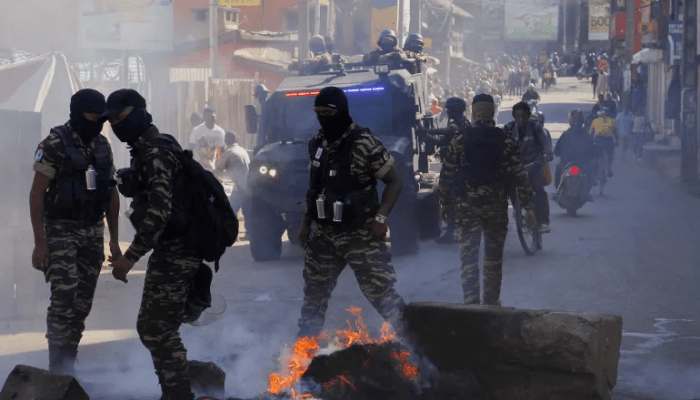Madagascar faces military mutiny as elite soldiers turn against president
Police officers in Madagascar clear a burning barricade after dispersing a crowd during a nationwide youth-led protest [Zo Andrianjafy/Reuters]
A powerful military unit in Madagascar has declared that it is taking control of the country’s armed forces, escalating a deepening political crisis that has pitted President Andry Rajoelina against the same soldiers who once helped bring him to power.
In a video message released on Sunday, officers from the Administrative and Technical Support Corps (CAPSAT) announced that all military orders, covering land, air, and naval forces .would now originate from their headquarters.
“From now on, all orders of the Malagasy army will come from CAPSAT,” the officers said, effectively challenging the authority of the country’s elected leadership.
Read also: Rajoelina asks for one year to fix Madagascar’s problems or resign
Hours earlier, the presidency had warned of an “attempted illegal and forcible seizure of power,” describing it as a grave threat to constitutional order. “There is an attempt to seize power at this time in the territory of the Republic, in complete violation of the Constitution and democratic principles,” Rajoelina said in a statement. He condemned the move as an effort to destabilise the country and urged security forces to defend the nation’s sovereignty.
The mutiny marks the most serious challenge to Rajoelina’s rule since his disputed reelection in 2023. It also carries deep historical echoes, CAPSAT played a decisive role in the 2009 crisis that ousted then-president Marc Ravalomanana and propelled Rajoelina, a former mayor of Antananarivo, into power.
This time, however, the unit appears to have turned against him. On Saturday, some CAPSAT soldiers abandoned their barracks on the outskirts of the capital to join anti-government protesters gathered at Antananarivo’s town hall. Reports later emerged of gunfire at the military camp after gendarmerie officials arrived for talks, though details of the incident remain unclear.
Read also:Madagascar protest deepens as president appoints new prime minister
In social media posts, CAPSAT accused the government of using force against civilians and said it had appointed a new army chief of staff, General Demosthene Pikulas.
“We have become bootlickers,” one group of soldiers said in a viral video. “We have chosen to submit and execute orders, even illegal ones, instead of protecting the population. Do not obey orders from your superiors—turn your weapons against those who order you to fire on your comrades.”
What began as demonstrations over water and power shortages in late September has evolved into a nationwide movement demanding change. Protesters accuse Rajoelina’s government of corruption, mismanagement, and indifference to worsening living conditions.
Read also: Youth-led protests shake Madagascar as president vows dialogue but refuses to resign
According to the International Monetary Fund, only around a third of Madagascar’s 30 million citizens have access to electricity, with blackouts lasting more than eight hours a day. Inflation, unemployment, and the rising cost of basic goods have further fuelled frustration.
“People don’t have refrigeration for medication, don’t have water for basic hygiene, and then there’s massive corruption,” said Ketakandriana Rafitoson, the global vice chair of Transparency International, in an interview with Reuters.
Prime Minister Ruphin Fortunat Zafisambo, a military general appointed after Rajoelina replaced his predecessor amid mounting protests, said the government was open to talks. “We are fully ready to listen and engage in dialogue with all factions – youth, unions or the military,” he said.
The African Union has expressed “deep concern” over the developments. Mahmoud Ali Youssouf, chairperson of the AU Commission, called on all sides to “exercise calm and restraint” and to resolve their differences peacefully.

